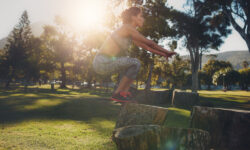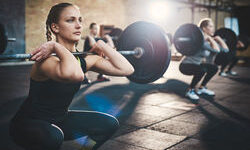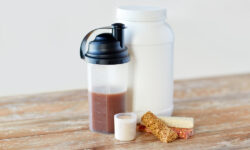Today’s teenagers have it tough. Covid hit young people hard as examinations, preparation for exams and any form of socialising went out of the window for nearly two years. The impact of Covid on teenagers is still being felt as many pupils continue to find it difficult to go back to school, college of university.
Many pupils speak of feelings of isolation, a lack of confidence and an irrational fear of crowds of people.
Those same children may also have missed out on getting regular exercise. While we heard a lot about people taking the Covid time to exercise at home and go for long walks, this wasn’t true of everyone. For every young person who did hour long walks with their family, there were many youngsters who were shut in their rooms, with only a computer for company.
We need to help this generation fall in love with exercise and, through that, find self confidence and a positive self-image.
For people of all ages exercise improves physical and mental health, but like everything, we need to learn how to exercise effectively. For those children who missed two years or more of regular PE lessons, extra help is needed now to instil exercise habits that last for life.
So how much exercise do teenagers need?
Most health experts recommend a minimum of 30 minutes of moderate to intense exercise three times a week, but that is a low bar and the more desirable amount to really increase health and instil good habits would be an hour of moderate to intense exercise daily. The 30 minutes, three times a week figure is a good starting point but the aim should be far more.
Of course, there is also the danger of over-exercising and teenagers are quite susceptible to over training. This can lead to injury, reduced immunity, sleeplessness and depression. And every parents’ dread is the mental impact of becoming too body conscious and developing an eating disorder. The key is to find a balance between exercise and all the other things that teenagers cram into their lives.
What types of exercise should teenagers be doing?
An effective programme should have four elements: cardio, strength, mobility and fun. It is the last one on the list that we sometimes forget.
If teenagers are in sports teams or doing a lot of different activities, the cardio will often look after itself. However, if that is not the case then cycling, swimming and running are all great ways to increase cardio. It is definitely worth either doing this as a family or encouraging the teen to join a club or a group of friends.
Many people wonder if it’s safe for teens to lift weights. In general, the answer is yes, so long as they are working with a weight that is not too heavy. The goal for strength training in the teen years should be to focus on form, using lower weights and higher reps, rather than trying to lift the heaviest weight possible.
If sports are a large part of a teenager’s life, agility training may also be included as a part of an ideal programme. This type of training enhances quickness and reaction time and includes exercises that train balance and power, and even offer a cognitive challenge.
Reducing anxiety
While a large portion of a teen’s exercise programme should be fairly high energy, there is also abundant evidence that mind-body exercises such as yoga can reduce anxiety and improve mental health in both healthy kids and those facing mental health challenges.
It is also worth considering how to add variety into the exercise programme. Boxing classes or martial arts really resonate with some teenagers. Dance is also a great way to hit all elements of fitness – its a tough cardio workout but also calls for balance and strength.
The last thing to take into account is how the exercise is framed. Unless the teenager is an elite performer and part of an organised programme, the emphasis should be on effort not performance. Qualities such as sportsmanship, competition and cooperation and friendship through rivalry should be the focus, not winning or always getting a personal best.
For advice on this or any other fitness-related topic, chat to one of our personal trainers who are based in the Outlooks Gym.
And for further information, check out the NHS advice page on teenagers and exercise.







